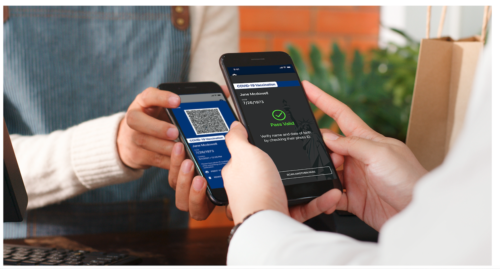
This week New York became the first state to make available a means for mobile digital confirmation that an individual has been vaccinated for COVID-19. Popularly known as “immunity passports” they are in fact more than that. The New York app, dubbed “Excelsior Pass” can also carry information regarding an person’s latest COVID-19 test result. The idea has been floated for some time, and while New York is the first state in the U.S. others are poised to follow. And outside the U.S., Israel – much further along in its vaccination process – has implemented their version called “Green Pass” and France is set to launch one soon. We have upon us a new aspect of the pandemic. There are questions that immediately arise.
First, how does it work? It is an opt-in program whereby people can utilize an app to supply evidence of their status if it is needed, just the way you download your boarding pass to get on an airplane – except instead of a seat number, this explains your vaccine status or you negative PCR or antigen test for COVID. When you download the app, you will be directed to provide information to confirm your identity. Once you do, a QR code is posted in your app that can be scanned when you need to provide proof of status. (For those who do not have a smart phone, there is an ability to print out the code which presumes ability to access a computer and printer). Those who are screening will have an app that will read your passport and provide verification. Which leads to the second important question.
Why have this? What is to be gained? Plenty, for both businesses seeking a pathway to recovery as well as individuals who wish to have more normalized access. Emerging from the pandemic, particularly as recovery may be undermined by emergent strains and complicated further by vaccine hesitancy, individuals may want to be reassurance regarding any environment they want to access. This can include a health care provider to a theatre to perhaps even in their own workplace. And therefore it follows suit that in the future businesses may see it as a competitive edge to offer an environment where both patrons and employees all have provided evidence of vaccination. Would you rather stay in a hotel that offers a stay where all staff and guests have been vaccinated or one that could not make that claim?
Who would use it? From theoretical to real – specific uses for the app are already emerging. In the New York announcement it was noted that several venues in New York State were already planning on its use, including Madison Square Garden with statements of support from the New York State Hospitality and Tourism Association, the New York State Tourism Industry Association, the New York State Restaurant Association, the Empire State Restaurant and Tavern Association and the MTA all citing the app as a means to resume in-person events and to return to more normal times. From your gym to your doctor to your employer, the possibilities are vast.
What is the impact? The app is not just about the mechanics of having a “pass” but ultimately in what having it means in one’s life. Some may not choose to participate – it does require one to opt-in. Choice has played a big role in this pandemic, with some seeing it as a choice whether to restrict their movements, socially distance or to wear a mask. And whether or not one gets vaccinated is clearly at this point a matter of choice, but the existence of the app may heavily influence that choice. Someone who is reticent about getting vaccinated may feel passionate about attending a football game. For many, the existence of the app and the requisite for vaccination for entry to multiple venues and services may be more of an incentive than protecting one’s health.
And as foreign countries consider opening up their borders once again, vaccination may be a foundational requisite for entry. In the old days, all sorts of shots were often required as a means for entry into foreign countries. Now your phone will serve just as an important means of entry as your actual passport. The app facilitates decision making regarding access not only to countries, but to many venues and services and perhaps even employment, particularly once the vaccine migrates from emergency use authorization to full licensure in the future. Having an app such as this, or one instituted by airlines, will likely be essential to at least foreign travel. And we all remember the stress of passengers on cruises early in the pandemic.
It almost certainly appears we are about to enter a new vista in the complex terrain of this pandemic and one that will most certainly raise ethical and legal questions as it plays out. But it will also raise practical questions. Will the various states be able to coordinate the technology so that a reading from the Excelsior Pass will be read when going to a sports game in New Jersey or to a government building in Washington, D.C.? Will it be translatable to whatever platform the airlines use. Will hotels be able to read the apps from all 50 states? These questions are all as inevitable as the emergence of the app itself. Stay tuned.

